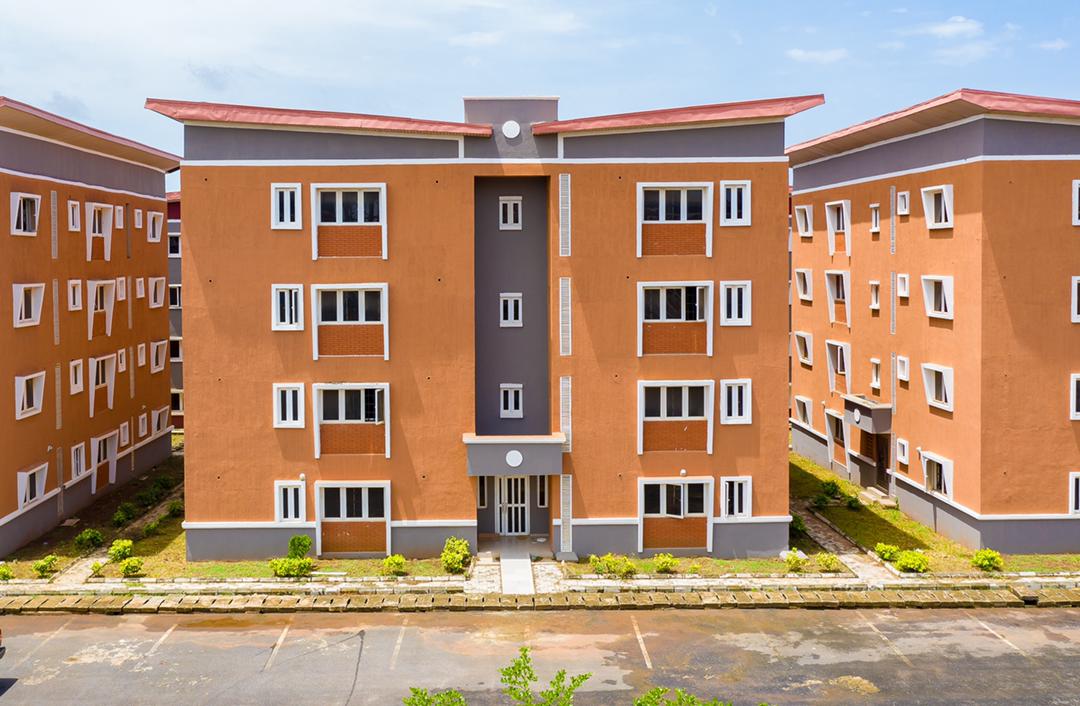Across Nigeria’s fast-growing cities, rent comes at a great expense, shaving off a major chunk of residents’ annual income. This trend was covered in a recent survey that showed that most Lagos residents spend up to 70% of household income on rent. This, of course, leaves little for savings and other expenditures.
This strain deepens the national housing crisis. Experts argue that rent-to-own schemes, which convert rent payments into eventual ownership, could provide a sustainable path forward.
Rent-to-own works by allowing tenants move into a home immediately and pay “rent” that gradually counts towards ownership.
“It is like a stepping stone for people who want to buy but aren’t ready yet due to financial constraints or other reasons,” explains Onwe Chidiebere Maxwell, a sales manager at a real-estate company in Abuja.
The Federal Mortgage Bank of Nigeria (FMBN) runs the most widely known rent-to-own scheme under the National Housing Fund (NHF). Its appeal lies in its official terms, which include no equity contribution, single-digit interest of 7% annuity and repayment periods of up to 30 years.
At the state level, Lagos operates the Lagos HOMS (Home Ownership Mortgage Scheme), offering both rent-to-own and mortgage models for eligible residents.
Private-sector players like Homes Funds Limited (FHFL) offer innovative models such as “Help-to-Own,” which contributes up to 40% of the home cost as a loan, allowing buyers to start with only a 10% deposit, with the balance funded via mortgage partners.
This is an alternative in cases where full rent-to-own is impossible and affordability is on the lookout.
Momentum and policy signal
Since last year, federal authorities have ramped up efforts on rent-to-own and rental assistance as a practical measure to boost home ownership. The Federal Ministry of Housing & Urban Development estimates the housing deficit to be around tens of millions and is rolling out the Renewed Hope Housing Programme.
Also, the Federal government’s housing portal showcases units (e.g., Karsana in the FCT) with access to 6% NHF mortgages and non-interest R2O options under FMBN.
One of the most attractive features of FMBN’s rent-to-own scheme is its “no equity” entry point. In a country where annual rent is paid upfront and savings are often strained, this gives NHF contributors a chance at ownership with just 7% annuity, provided repayments don’t exceed one-third of income.
Schemes like Lagos HOMS and FHFL’s Help-to-Own also targets lower- and middle-income earners who cannot raise the initial 20–30% deposit but can pay in instalments. Since Lagos HOMS took off, it has drawn thousands of subscribers and beneficiaries taking ownership.
The user experience has also been streamlined in government-backed programmes. Eligibility and documentation requirements are clear; NHF contributions, residency proof and tax compliance. Lagos, for instance, has clear guidelines that ensure instalments remain within reach of household income.
Rent-to-own is already proving to be a transformative tool in Nigeria’s urban housing landscape. For salaried, NHF-contributing renters, FMBN’s scheme has cushioned effects with its no-equity feature, long tenors, and fixed payments that convert rent into ownership.
For Lagos residents with steady income, Lagos HOMS has shown that state-backed initiatives can help bridge. FHFL’s Help-to-Own and FMBN’s non-interest R2O expand the options for households with varying incomes.
Approaching rent-to-own schemes
The first step for any prospective homeowner is to check for eligibility. For the Federal Mortgage Bank of Nigeria (FMBN)’s rent-to-own or other mortgage-like options, you must be a contributor to the National Housing Fund (NHF) and ensure that the monthly or annual payment commitment does not exceed one-third of your verified income.
For state-level applications like the Lagos HOMS, applicants must demonstrate residency or tax compliance, along with proof of sustainable income streams. Different requirements apply to different agreements.
Documentation is the backbone of any successful housing transaction, and participants in rent-to-own schemes should insist on proper documentation at every stage.
This includes offer letters, allocation letters, service charge schedules, and a clearly outlined arrangement for the transfer of property title once full payments are made.
Schemes backed by institutions like FMBN, FHFL, and Lagos HOMS have standardised documentation that protects the rights of the buyer and ensures accountability throughout the process.
Finally, households must plan their exit strategy well in advance. Rent-to-own is designed as a stepping stone to ownership, but if income rises over time, it is advised to repay the balance early or refinance into a lower-rate mortgage package, where available. By doing so, households reduce the overall cost of homeownership.
In a traditional landlord–tenant setting, this can be somewhat sketchy; and as such, you should plan ahead.
“If the tenant chooses to buy, the money paid as rent credits is usually applied towards the down payment price. If they don’t buy, these credits are often forfeited,” Maxwell, the sales manager, says of traditional arrangements.
Refinancing through institutions such as the NMRC or early repayment options under FMBN schemes are more flexible, reliable options.
The road ahead
Amidst Nigeria’s housing crisis, rent-to-own has emerged as one notable option, bringing respite to salaried and semi-urban families across Nigeria’s cities.
Backed by the government, supported by refinancing institutions, and embraced by state schemes, it is already reducing the urban ownership gap. For many families, it’s a path to building assets, security and stability in an increasingly complex society.
In Nigeria, the high rental costs in growing cities, such as Lagos, consume up to 70% of household income, impacting savings and deepening the national housing crisis. Rent-to-own schemes are emerging as a viable solution, allowing tenants to gradually own their homes through rent payments. The Federal Mortgage Bank of Nigeria (FMBN) offers a prominent rent-to-own scheme under the National Housing Fund with benefits like no equity requirement and a manageable 7% interest rate. Similarly, state-level initiatives like Lagos HOMS and private-sector solutions such as FHFL's Help-to-Own are providing paths to ownership for low- and middle-income earners.
Since last year, federal efforts have increased to promote rent-to-own models as a means to alleviate housing deficits. The government's housing portal offers options like non-interest R2O schemes for NHF contributors, reducing the barriers faced due to upfront payment requirements. Efficient administration and clear guidelines have improved the user experience in these programs, making home ownership more attainable.
Prospective homeowners are advised to verify eligibility and proper documentation for rent-to-own schemes to ensure protected buyer rights. Planning for an early repayment or refinancing can help reduce the overall homeownership costs. Ultimately, rent-to-own is becoming an appealing option in addressing Nigeria’s housing issues, aiding families in asset building and achieving stability.






